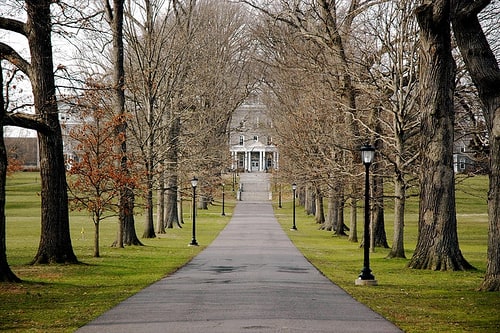
Swarthmore is again in the news over campus speech. Just yesterday, Hussein Aboubakr, an Egyptian political refugee who’s written about anti-Semitism among Egyptian Muslims, spoke at an event sponsored by Swarthmore’s pro-Israel groups. According to Swarthmore’s Students for Israel, some of the students who attended the event came only to scoff: “As [Aboubakr] tearfully recalled painful experiences in a military prison of being assaulted and cursed at, our peers prepared to yell at him and say that he “can’t f***ing say that.” A student interviewed by the Swarthmore Phoenix admitted to interjecting at the end of Aboubakr’s talk. Aboubakr, she said, argued that “Arabs constitute a failed culture that has no place in the modern world” and that they “are taught from the moment they’re born that their sole purpose in life is to kill Jews.”
Swarthmore’s students seem allergic to opposing opinions. In May 2013, Danielle Charette, a founder of Swarthmore’s Conservative Society wrote about how at an open meeting of Swarthmore’s Board of Managers, called to solicit opinions on fossil fuel divestment, protesters seized control and “delivered speeches that condemned the ‘liberal script’ in the name of “radical, emancipatory change.” The liberal script is, of course, dialogue, which in the view of the protesters and their supporters would have been futile in the face of “hegemonic power structures.”Ms. Charette stood up and “reminded the protesters that other members of the college were there to hear various perspectives.” Then, “students began to shout and clap in unison, drowning” her out. The professors in the room uttered not a peep.
In February 2014, moreover, Cornel West and Robert George came to campus to discuss how to engage with people who do not share your views. No one disrupted this event, though some students “created a zine which opposed tolerance of George’s viewpoints,” his opposition to gay marriage in particular. One student, evidently standing in for “many students” who “expressed dissatisfaction with the event” commented: “What really bothered me is, the whole idea is that at a liberal arts college, we need to be hearing a diversity of opinion.”
Two things are worth nothing about this most recent incident. First, the student who confronted Aboubakr says that she did so because she was “deeply hurt and triggered by his comments.” But, taking her at her word that Aboubakr made indefensible assertions about Arab culture (an assertion that Students for Israel doesn’t dispute) there’s no reason to think that she would not have been equally “triggered” by a more straightforward treatment of Aboubakr’s theme, Muslim antisemitism. In 2011, the Pew Research Center conducted surveys in seven majority Muslim nations, including Aboubakr’s Egypt, and found that “in all seven . . . less than 10% have a positive opinion of Jews. Indeed, outside of Indonesia, less than 5% offer a positive opinion.” In Egypt, fully 94% admit to holding a “very unfavorable” opinion of Jews. On a related note, there “is no Muslim public in which even 30% accept that Arabs conducted the (September 11) attacks.” It doesn’t take someone who has been persecuted, as Aboubakr apparently was, for studying Hebrew, to think that there may be something amiss here. But one can’t even begin to have a discussion of what’s amiss if identifying a phenomenon that might reflect poorly on a culture or religion is rejected as “triggering.”
Second, while the campus left—especially at Swarthmore where a campus right barely exists—has to be held responsible for the state of discussion, its opponents should be careful about adopting its language of victimization. Even by the account of Students for Israel, Aboubakr’s talk was not shut down by a powerful campus left. Instead, two of the total of seven people who showed up for the talk were rude. One had “a book open on his desk at the time that Aboubakr began speaking and clearly seemed to be . . . more invested in reading than listening”; another persisted in asking a question before the question and answer session started. During the question and answer session, some students were angry and raised their voices when they challenged Aboubakr. Aboubakr “reacted negatively to this rude treatment”—according to the student who interjected, Aboubakr told her that “You’re like this because you conform. I can see that you’re a Jew-hater”–and things degenerated into a shouting match. That’s not good, but it’s not exactly McCarthyism.
So if they did a survey of Jews, would 90/95 percent of them say that they have “unfavorable views” of Arabs?
Probably.
@Fred Hmm…yes, Jews probably would have a ‘unfavorable view’ of a group that is trying to wipe them off the face of the earth. How dare they…